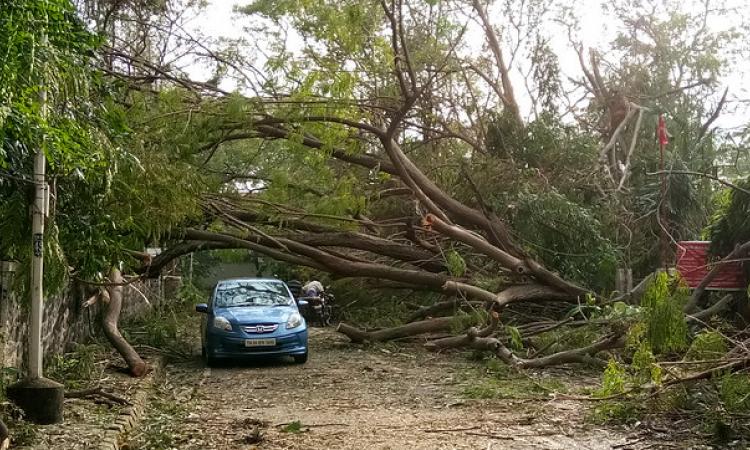
Making a landfall in Raigad district, cyclone Nisarga wanes but causes heavy rains in western Maharashtra
Anticipated to be a major cyclonic storm, after the one that affected Mumbai in 1948, Cyclone Nisarga caused heavy rains in the city which led to water-logging in some areas. The cyclone made a landfall in Raigad district and later diverted towards Pune and then from Nashik to Vidarbha. The cyclone claimed four lives and caused heavy rains in parts of Pune and western Maharashtra, especially Satara district, which experienced gusty winds and relentless showers.
The significant human costs of this disaster will become clearer in the coming days. However, experts feel that Mumbai needs to be well-prepared for tackling cyclones as more intense cyclones are expected in the Arabian Sea in the future, given the pace at which it is warming up (The Hindu, The Indian Express, Livemint)
River erosion in Assam gets a natural calamity status
Following the request from the Assam government to grant adequate compensatory measures towards relief and rehabilitation of erosion-hit people and consider erosion as a natural calamity, the 15th Finance Commission has accorded natural calamity status to river erosion in the state and recommended for adequate compensation including rehabilitation under SDRF and NDRF. Along with this, the Centre has sought from the state a detailed report incorporating the details of those people in the state who were rendered landless and homeless due to erosion. Also, Chief Minister Sarbananda Sonowal has informed that the state has already received Rs 386 crore to tackle the issues related to flood and erosion in the state. (Outlook India)
Rule curve of hydel dams in Kerala gets amended
To avoid flooding during the upcoming monsoon, the Central Water Commission (CWC) has amended the rule curve of hydel dams in the state. A rule curve is a pre-defined level of water to be maintained on a specified date in the reservoir to fill it in stages during the monsoon season, considering conservation and flood control aspects. With the new amendment, the shutter gates of the Idukki reservoir will be opened when the water level reaches 2,373 feet on June 10, as against the earlier threshold of 2,398 feet. Therefore, as per the new rule, a blue alert will be issued four feet below the rule level, while an orange alert will be issued two feet below the rule level and a red alert will be issued one foot below the rule level. (Times Now)
After 46 years, Ukai dam water level crosses 319 feet in the month of June
According to the authorities, the water level in Ukai dam in Tapi district, Gujarat, stood at 319.86 feet in the month of June.
The dam is having such a stock after 46 years. It was in 1974, that the water level in it was 318.45 feet and since then, the water level never crossed the 300-feet mark before monsoon.
The good stock in the dam, that supplies water for irrigation, drinking and industry purposes in Surat, Ankleshwar,Tapi, Navsari and Valsad districts, implies that there would be no shortage of water supply in the region even if the rainfall is poor this year. (The Indian Express)
Covid-19 pandemic delays revival of Chennai lakes
The pandemic has delayed rejuvenation of four lakes-- Medavakkam, Narayananapuram and Kilkattalai and Velachery-- and Buckingham Canal in Chennai as the respective panels constituted for their revival work have sought more time to finalise the action plans. The panel pertaining to the first three lakes was supposed to tackle 18 lakh million litres of untreated sewage discharged into these lakes. However, due to lockdown the members could not conduct inspection work and thus, they have been granted two months' time to finish their work. The panel constituted to protect Velachery lake has been granted one more month while the panel for Buckingham canal has been asked to submit its report by August 20. (The Times of India)
This is a roundup of important news published between May 26 - June 4, 2020. Also read policy matters this week.